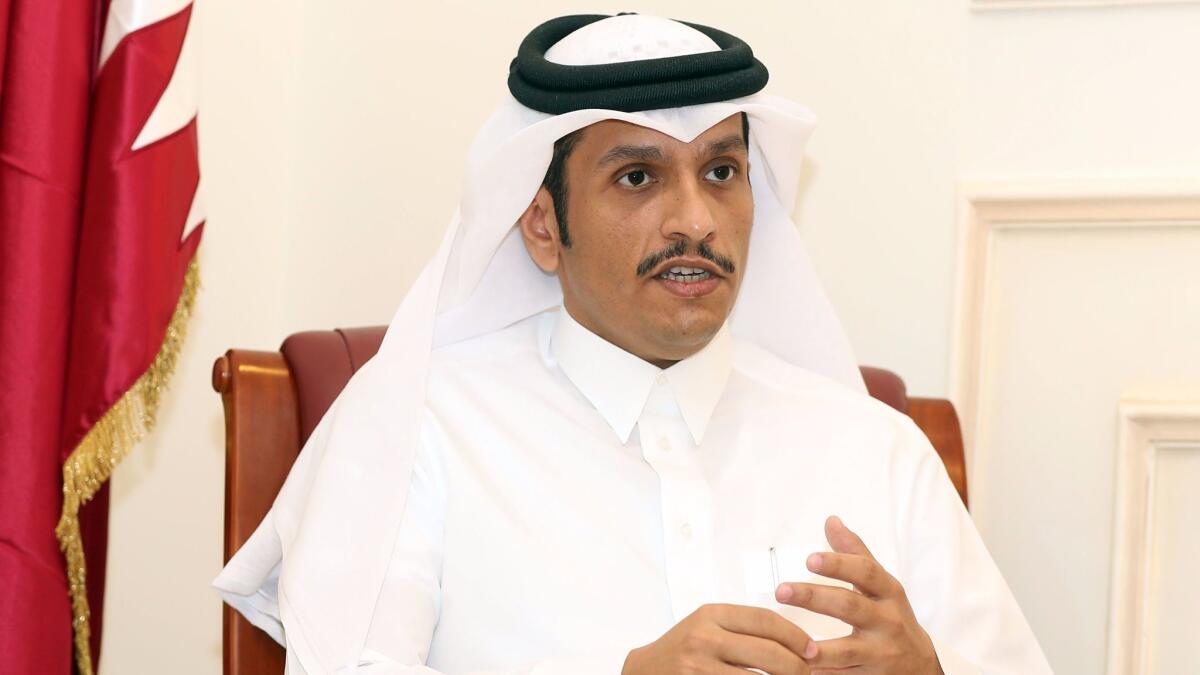Arab nations add dozens to Qatar terror list, escalating crisis in the region

- Share via
Reporting from DOHA, Qatar — A group of Arab countries early Friday expanded a terror sanctions list with 12 organizations and 59 people they described as being associated with Qatar, the latest move in a growing diplomatic dispute that’s seen the energy-rich nation isolated by Saudi Arabia and others.
Qatar dismissed the terror listing as part of “baseless allegations that hold no foundation in fact,” standing by earlier defiant statements by its top diplomat that the Arab nations had no “right to blockade my country.”
The sanctions list further tightens the screws on Qatar, home to a major U.S. military base and the host of the 2022 FIFA World Cup, and shows the crisis only escalating despite Kuwaiti efforts to mediate an end to the rift.
Bahrain, Egypt, Saudi Arabia and the United Arab Emirates said they sanctioned the groups and individuals because of “the continuous and ongoing violations of the authorities in Doha of Qatar’s commitments and obligations.”
Six of the organizations are already considered militant groups in Bahrain, a Sunni-ruled, predominantly Shiite island home to the U.S. Navy’s 5th Fleet and an under-construction British naval base. Bahrain has been gripped by a government crackdown on dissent for over a year now.
Among the individuals named is Youssef Qaradawi, an Egyptian-born cleric considered a spiritual leader of the Muslim Brotherhood, a Sunni Islamist group. Qaradawi has been tried and sentenced to death in absentia in Egypt since the 2013 military overthrow of elected President Mohammed Morsi, a Brotherhood member.
Other names involving Egypt include more Brotherhood members and those once belonging to Gamaa Islamiya, an Islamist group that carried out a series of bloody attacks in Egypt in the 1990s before renouncing violence in 2000s. One is the brother of the Gamaa Isalmiya assassin who killed Egyptian leader Anwar Sadat in 1981.
Egypt separately has asked the United Nations Security Council to investigate reports that Qatar “paid up to $1 billion to a terrorist group active in Iraq” to recently free 26 hostages, including members of its ruling family, saying it would violate U.N. sanctions.
Names involving Libya include militia commanders and the Benghazi Defense Brigade, which is battling forces commanded by Gen. Khalifa Hifter, who has the backing of Egypt and the UAE amid that country’s chaos. The sole Yemeni, Abdel-Wahab Humayqani, is the leader of a Salafi party who has been accused by the U.S. of financing Al Qaeda in the Arabian Peninsula, the terror group’s branch in Yemen.
Qatar long has denied supporting or funding terror groups. However, Western diplomats accuse Qatar’s government of allowing or even encouraging the funding of some Sunni extremists, such as Al Qaeda’s branch in Syria.
Responding to the list overnight, Qatar issued a statement saying: “We do not, have not and will not support terrorist groups.”
“We lead the region in attacking the roots of terrorism — by giving young people hope through jobs, replacing weapons with pens by educating hundreds of thousands of Syrian refugees and funding local community programs globally to challenge extremist agendas,” it said.
In a wide-ranging interview Thursday with the Associated Press, Qatari Foreign Minister Mohammed bin Abdulrahman al Thani repeatedly denied that his country funded extremists and he rejected the idea of shutting down its Al Jazeera satellite news network, something suggested as a demand of the Arab nations.
He said Qatar, as an independent nation, also had the right to support groups such as the Muslim Brotherhood, despite the fact that its neighbors view it as a threat to their hereditary rule.
His hard line mirrored that of a top Emirati diplomat who told the AP on Wednesday that the United Arab Emirates believes that “there’s nothing to negotiate” with Qatar.
Worried Qatar residents have responded to the crisis by emptying grocery stores in the capital of Doha, and Saudi Arabia has blocked trucks carrying food from entering the country across its only land border.
Doha is a major international travel hub, but flagship carrier Qatar Airways now flies increasingly over Iran and Turkey after being blocked elsewhere in the Middle East. On Wednesday, Emirati officials shut down the airline’s offices in the UAE.
Al Jazeera’s offices have been shut down by authorities in Saudi Arabia and Jordan. The network also said Thursday night that its websites had come under a sustained cyberattack.
Turkish President Recep Tayyip Erdogan, on the other hand, has approved sending troops to an existing Turkish base in Qatar as a sign of support.
President Trump, who tweeted Tuesday about Qatar funding extremists, called Qatari ruler Sheik Tamim bin Hamad al Thani on Wednesday and offered to host leaders at the White House to resolve the crisis.
But Sheik Mohammed told the AP on Thursday that Sheik Tamim “is not going to leave the country while the country is in blockade,” in effect turning down the mediation offer. Analysts have raised the prospect of a palace coup in Qatar, a hereditary monarchy ruled by the Al Thani family that has a history of such changes in leadership.
Trump’s administration later suggested Secretary of State Rex Tillerson, who as Exxon Mobil’s CEO had business with Qatar, as a possible mediator.
Qatar said Friday that Tillerson spoke to its foreign minister and discussed the crisis, without offering specifics.
More to Read
Sign up for Essential California
The most important California stories and recommendations in your inbox every morning.
You may occasionally receive promotional content from the Los Angeles Times.










